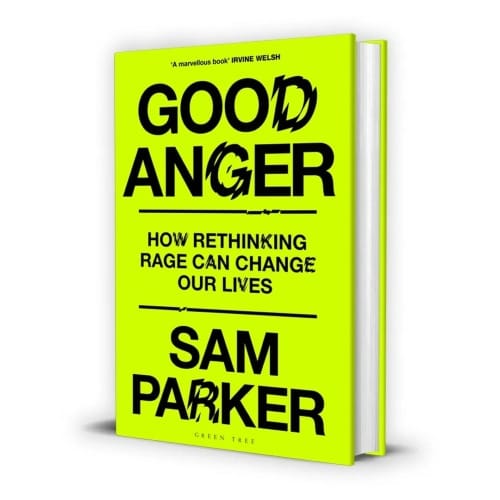Rage, Reconsidered
Long banished from polite society, anger is making a comeback – at least in the pages of Sam Parker’s new book. He argues that learning to welcome our anger could be the most radical act of self-care yet.

In a culture that’s become fluent in the language of mental health, anger remains a taboo – rarely discussed, often misunderstood, usually sidelined as something to be suppressed.
Sam Parker, a journalist for GQ, is determined to change that. In his new book Good Anger, Parker argues that anger can be a vital force for personal growth, happiness and even professional success. The book is part memoir, part manifesto – and entirely a product of its cultural moment: an era when we’ve learned to hashtag our sadness and destigmatise our anxiety, but still treat anger like a contagious rash. An era when, at dinner parties, say, anger has been the unruly guest we’re expected to leave at the door – the one who might knock over the wine and say aloud what everyone else only thinks.
For Parker, the journey to writing Good Anger was as much personal as it was professional – a reckoning with his own history of anxiety, and a challenge to the mental health orthodoxy that left anger out in the cold. In this interview, we explore the personal tipping points and cultural shifts that compelled him to write Good Anger now, and why he believes it’s time to bring this powerful emotion out of the shadows.
Was there a personal tipping point or cultural moment that made you feel this book had to be written now?
As a journalist, I’ve reported closely on the mental health awareness revolution of the past five to eight years. In a relatively short space of time, we’ve dismantled centuries-old stigma around conditions like depression and anxiety. That’s been a great development, but so far anger has been very much left out of the conversation.
And yet, over the same period in my personal life, learning about the role healthy anger plays in feeling happier and healthier proved utterly life-changing. It’s what finally broke me free of a lifetime of anxiety. So seeing this gap, between my own experiences and what I call affectionally #mentalhealth, is what convinced me to start researching the book.
I think more and more people are waking up to the fact that what we’ve always been told about anger – that it is inherently undesirable or negative – is not just wrong, but deeply damaging to us. Certainly that’s the impression I get from the response to the book so far.
Much of the book touches on masculinity, vulnerability and emotional repression. How does Good Anger evolve or challenge these themes in the current social climate?
The conversation we’re used to having about anger centres around what psychologists call “anger out”: people who can’t stop losing their temper and getting into arguments or confrontations. That has become an even bigger topic in the social media age, where our anger is stoked while being denied any opportunity for catharsis by design, to keep us around longer on platforms like Facebook and X.
Good Anger is, as you point out, much more about what I call the “other anger problem”: suppressing and repressing it. The vast majority of us are on that end of the spectrum. We are peace-keepers, people pleasers, conflict-avoiders… and quite often, unhappy and passive-aggressive without meaning to be as a result. “Anger in” causes much silent suffering and is, in many ways, worse for us than being hot heads.

The idea of emotional literacy is gaining momentum. Do you see Good Anger as part of a wider movement toward emotional re-education, particularly for men?
The fact emotional literacy can, in many ways, predict success in the workplace even more so than skills or experience has been an open secret since the 1990s, thanks to people like Daniel Goleman (author of Emotional Intelligence). The world’s top companies made this central to their hiring policies a long time ago. So yes, I do see Good Anger as part of the continuing conversation around understanding our emotions better can be tactically advantageous, not just “healthier”. There’s an entire chapter in my book about how getting smart with anger can benefit us professionally. For example, learning how to tell people when we’re pissed off – whether it is our direct report, one of our peers, or our boss – can be transformative. It certainly was for me.
When it comes to gender, one of the more pernicious and enduring myths about anger is that men somehow have ‘more’ of it. That is incorrect. Men are more likely to act aggressively, which is where the idea comes from. But that’s a behavioural choice. The emotion of anger itself is felt equally by everyone. And actually, the tendency to suppress or deny anger is statistically more prevalent among women. We’ve come a long way in teaching boys “it’s OK to be sad”: I think we now need to teach more young girls it’s OK to be angry.
Do you think there’s space for brands/businesses to harness anger – not in a reactive or performative way, but as a force for meaningful change or deeper connection with their audience?
I think there is huge scope for brand and businesses to work on their internal culture around anger: how it is recognised, acknowledged and expressed within a team. Too much anger at work is turned into toxic bullying or – more often – stifled and shared behind people’s backs on Slack. This is terrible for morale and productivity. The good news is there are structural and communication changes you can make that address this.
Using anger to engage with audiences or customers is trickier. I think if brands stand up publicly against injustice in a way that feels proportional and authentic, that can help build trust with the public. But it has to be backed with meaningful action. The reactive/performative trap you mention is still the one I see companies fall into most often; I think the public can smell it a mile off now.
If someone closes this book and feels just one thing – what do you hope that is?
That anger is nothing to be afraid or ashamed of. That it is a neutral, legitimate emotion there to protect and galvanise you if you learn how to listen to it. That if you want to feel less anxious or depressed, working on your relationship with anger is likely to play a big part in your healing and it can be done – no matter how unlikely it might seem right now.
There’s a strong sense of accountability in your work, but also compassion. How did you navigate writing about difficult emotions without leaning into shame or defensiveness?
Thank you. The personal elements of the book were naturally the ones I felt most nervous about people reading in many ways. None of us escape our childhoods without a decent amount to feel rageful about, even if those who hurt us didn’t mean to. The trick is acknowledging the anger is there without feeling shame or projecting blame. Walking that line in writing is difficult, but thankfully I’ve had a lot of practice.
| SEED | #8329 |
|---|---|
| DATE | 24.06.25 |
| PLANTED BY | PROTEIN |


